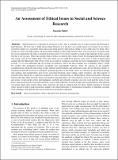| dc.description.abstract | Ethical behavior is important in all aspect of life. This is certainly true of social research and Research in hard Sciences. The best way to think about ethical behavior is to ask how you would expect to be treated if you were a researcher subject or a researcher whose data were being used by other person. Make it even a little closer to home,. How would you want your child, parent,. Or closer friend mentally or physically treated if they were involved in a research study. If everyone approaches the ethic or research from this point of view there would be no need for the materials in this section, but that is not the case. When most people think of ethics (or morals), they think of rules for distinguishing between right and wrong, such as the Golden Rule ("Do unto others as you would have them do unto you"), a code of professional conduct like the Hippocratic Oath ("First of all, do no harm"), a religious creed like the Ten Commandments ("Thou Shalt not kill..."), or a wise aphorisms like the sayings of Confucius. This is the most common way of defining "ethics": norms for conduct that distinguish between acceptable and unacceptable behavior. Strive for honesty in all scientific communications. Honestly report data, results, methods and procedures, and publication status. Do not fabricate, falsify, or misrepresent data. Do not deceive colleagues, granting agencies, or the public. Strive to avoid bias in e xpe rimental design, data analysis, data interpretation, peer review, personnel decisions, grant writing, e xpert testimony, and other aspects of research where objectivity is e xpected or required. Avoid or minimize bias or self-deception. Disclose personal or financial interests that may affect research. Keep your promises and agreements; act with sincerity; strive for consistency of thought and action. Avoid careless errors and negligence; carefully and critically e xa mine your own work and the work of your peers. Keep good records of research activities, such as data collection, research design, and correspondence with agencies or journals. Share data, results, ideas, tools, resources. Be open to criticism and new ideas. Finally, train ing in research ethics should be able to help researchers grapple with ethical dilemmas by introducing researchers to important concepts, tools, principles, and methods that can be useful in resolving these dilemmas. | en_US |

